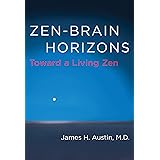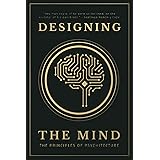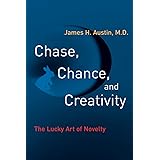Zen and the Brain: Toward an Understanding of Meditation and Consciousness Reprint Edition
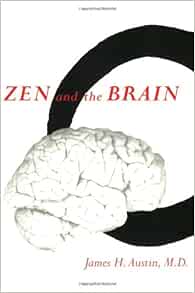

Use the Amazon App to scan ISBNs and compare prices.





A neuroscientist and Zen practitioner interweaves the latest research on the brain with his personal narrative of Zen.
Aldous Huxley called humankind's basic trend toward spiritual growth the "perennial philosophy." In the view of James Austin, the trend implies a "perennial psychophysiology"because awakening, or enlightenment, occurs only when the human brain undergoes substantial changes. What are the peak experiences of enlightenment? How could these states profoundly enhance, and yet simplify, the workings of the brain? Zen and the Brain presents the latest evidence. In this book Zen Buddhism becomes the opening wedge for an extraordinarily wide-ranging exploration of consciousness. In order to understand which brain mechanisms produce Zen states, one needs some understanding of the anatomy, physiology, and chemistry of the brain. Austin, both a neurologist and a Zen practitioner, interweaves the most recent brain research with the personal narrative of his Zen experiences. The science is both inclusive and rigorous; the Zen sections are clear and evocative. Along the way, Austin examines such topics as similar states in other disciplines and religions, sleep and dreams, mental illness, consciousness-altering drugs, and the social consequences of the advanced stage of ongoing enlightenment.
Customers who viewed this item also viewed
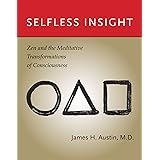 Selfless Insight: Zen and the Meditative Transformations of Consciousness (The MIT Press)Paperback$36.98 shippingOnly 3 left in stock - order soon.
Selfless Insight: Zen and the Meditative Transformations of Consciousness (The MIT Press)Paperback$36.98 shippingOnly 3 left in stock - order soon.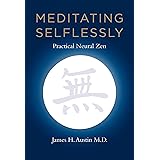 Meditating Selflessly: Practical Neural Zen (The MIT Press)Paperback$36.98 shippingTemporarily out of stock.
Meditating Selflessly: Practical Neural Zen (The MIT Press)Paperback$36.98 shippingTemporarily out of stock.
Editorial Reviews
Review
"This is a book written with passion and seriousness."--"Psychoanalytic Books"
& quot; . . . remarkable in its synthesis of the mystical point of view with the scientific.& quot; -- Bodhi Tree Book Review
& quot; This is a book written with passion and seriousness.& quot; -- Psychoanalytic Books
" . . . remarkable in its synthesis of the mystical point of view with the scientific." -- "Bodhi Tree Book Review"
" This is a book written with passion and seriousness." -- "Psychoanalytic Books"
Review
... remarkable in its synthesis of the mystical point of view with the scientific.
―Bodhi Tree Book ReviewAbout the Author
Product details
- Publisher : The MIT Press; Reprint edition (July 2, 1999)
- Language : English
- Paperback : 872 pages
- ISBN-10 : 0262511096
- ISBN-13 : 978-0262511094
- Item Weight : 3.25 pounds
- Dimensions : 7 x 1.5 x 10 inches
- Best Sellers Rank: #1,122,990 in Books (See Top 100 in Books)
- #106 in Buddhism (Books)
- #458 in Neuroscience (Books)
- #508 in Neuropsychology (Books)
- Customer Reviews:
Customer reviews
Top reviews from the United States
There was a problem filtering reviews right now. Please try again later.
As for the weakness, it’s that the book was written in the late 1990’s. Ordinarily, I would say that wouldn’t matter much, but concerning our understanding of the brain, it might as well have been the Stone Age—hyperbole duly noted. One doesn’t put together a book of almost 1000 pages overnight, and so much of the references for “Zen and the Brain” are actually from papers from the 1980’s and earlier. The fMRI (functional Magnetic Resonance Imaging) machine didn’t even come out until the early 1990’s, but—of course—it took a while for the studies featuring this powerful technology to reach publication.
The book is arranged into a whopping 158 chapters divided amongst 8 parts. Some of the chapters are pure neuroscience, and there are detailed descriptions of the brain and the functions of its various parts. Other chapters are designed to give one an insight into the practice of Zen and aren’t technical at all. The author has a reasonably engaging writing style when he’s not conveying the minutiae of brain science. He tells stories of his experience as a practitioner of Zen, and passes on the wisdom of past Zen masters.
I have an unconventional recommendation for this book, which I got so much out of. I recommend you first check out the book “Zen-Brain Horizons” put out by the same author and press (MIT Press) in 2014. While I haven’t yet read that book, it seems to hold three advantages. First, it’s only one-third as long and seems to cover similar material. Obviously, it goes into far less detail. (But you may find that a plus.) Second, the 2014 book is reasonably priced. “Zen and the Brain” is one of the most expensive books I’ve bought in recent years. I’m not saying I regret paying as much as I did, because it was a useful book, but cheaper would be better. Finally, the 2014 has the benefit of access to a lot of great research from the past couple decades. If you read the 2014 book and think you need more detail about the brain, then—by all means—get this book.
Top reviews from other countries
The publishers briefly describe the work as a "Comprehensive text on the evidence from neuroscience that helps to clarify which brain mechanisms underlie the subjective states of Zen, and employs Zen to 'illuminate' how the brain works in various states of consciousness".
Zen Unbound have said of this book "This new book is surely THE most important zen book of the decade..".
The Journal of the American Medical Association (the most widely circulated medical journal in the world) said of this work "Zen and the Brain is well worth reading by those interested in cognitive brain function, especially the mechanics of consciousness. However, it is far from a dry scientific text and would be enjoyable to someone more interested in the philosophical implications"
Zen and the brain also won the 1998 Scientific and Medical Network Book Prize.
The work is written in a most engaging style and is divided into 158 chapters, which makes it very easy to read for such a large work. The work also includes a number of interesting appendices, a very useful glossary and a section containing copious references and notes.
There are also a number of subsequent/follow-up works Zen-Brain Reflections and Selfless Insight , both of which are also excellent and Meditating Selflessly which is due to be published in November 2011.
Me semble un livre compliqué et tordu.
Reviewed in Italy on February 5, 2016

